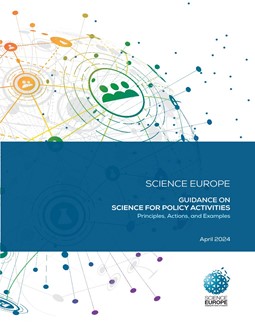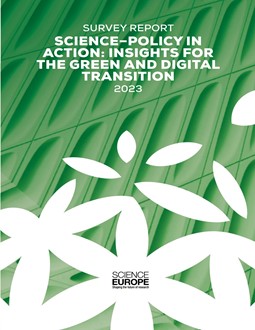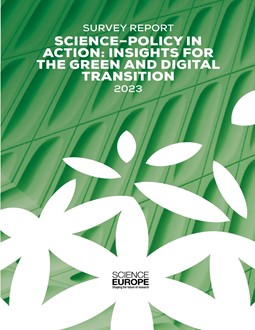
-
Share on
Science for Policy Activities: Enabling Dialogues for Decision Making
Presentation, roundtable, and networking reception
Decision makers must often deal with complex, knowledge-demanding challenges for which simple solutions do not exist. Scientific research can support them by offering rigorous evidence to enhance understanding of the problem and assess potential implications of the available options.
Such science-based contributions are able to improve the quality, effectiveness, and efficiency of policy making. Enabling bi-directional interaction between the science and policy communities is a challenge that requires trust, commitment, and collective engagement.
In its 2021-2026 Strategy Plan, Science Europe set the priority to “strengthen the role and contribution of science in tackling societal challenges.” Supporting research–policy interactions and promoting science-based policy making is part of this priority.
Science Europe is launching new Guidance on Science for Policy, which aims to provide relevant definition, principles, actions, and examples for Science Europe members and similar research organisations who want to engage in research–policy dialogues. The institutional mandate, the principles of quality, integrity, and transparency, the need for dedicated resources, and the goal to provide science-based options (rather than advice) were identified as fundamental principles for guiding research organisations.
This guidance builds on the 2023 survey report “Science Policy in Action. Insights for the Green and Digital Transition” that presented guidance, principles and examples for research funding and research performing organisations.
Objective
This event will present the Science Europe Guidance on Science for Policy activities. The guidance will:
- define Science for Policy activities in the case of Science Europe Member Organisations
- present the principles and values
- propose actions for designing and operating Science for Policy activities
- provide examples
- discuss cross-cutting challenges
The Guidance will be discussed with a high-level panel consisting of leaders of research organisations who directly engaged in science for policy activities.
Round table Discussion
The discussion with high-level representatives of research organisations will address the following questions:
- What specific actions can research funding and research performing organisations take to strengthen the role of science in supporting policy making?
- Reflecting on the current landscape of science for policy activities, especially after the COVID-19 pandemic crisis and the EU Council Conclusions in December 2023, what are the most notable examples of science for policy activities in your countries? What lessons have you learnt that might inspire other countries?
- In a context of rising geopolitical tensions and multiple crises, how do you see international co-operation in science for policy making?
- How should ethical considerations weigh in the debate when scientific research is used to inform policy making? And how can policy makers ensure that ethical principles are upheld?
- In light of the growing digitalisation and emergence of Artificial Intelligence, how can research organisations leverage technology and data-driven approaches to enhance the impact of science on policy making?
- Looking ahead, what are the emerging trends or areas of focus that research organisations should prioritise to further strengthen the nexus between science and policy making in the coming years?
Guidance on Science for Policy Activities
Science can and should support policy- and decision makers by providing rigorous evidence to increase understanding of problems and assess available options. This guidance aims to support the development of 'Science for Policy' activities in research organisations.
Science–Policy in Action: Insights for the Green and Digital Transition
This report aims to identify activities for science-informed policy making, to map those funded and performed by Science Europe Member Organisations, and suggests some recommendations. It is based on a survey held among Science Europe Member Organisations and a subsequent focus group.










